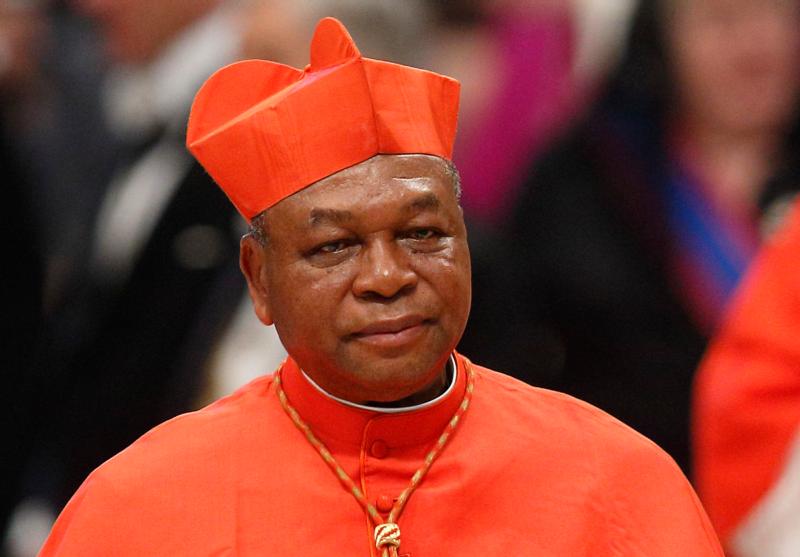
Cardinal John Olorunfemi Onaiyekan of Abuja, Nigeria, arrives for a consistory in St. Peter’s Basilica at the Vatican in this June 28, 2017, file photo. In a speech in Rome Jan. 8, Cardinal Onaiyekan said he doesn’t want to find a moderate Muslim to dialogue with, but one who is convinced of his faith. (CNS photo/Paul Haring)
VATICAN CITY (CNS) — January is dialogue month at the Vatican.
From World Peace Day Jan. 1, to the World Day of Migrants and Refugees Jan. 14 and concluding with the Week of Prayer for Christian Unity Jan. 18-25, Pope Francis preaches about dialogue.
In the teaching of Pope Francis, the purpose of dialogue is not to achieve a homogenized unity, but to move humbly, with respect, toward a community and a world where differences are not threatening, but enriching and therefore cannot be manipulated by those who want to sow fear, hatred and violence.
[hotblock]
Recently, Pope Francis has been describing as “ideological colonization” the drive, purposeful or accidental, to create a global — and therefore, bland — culture. Religious differences often are the first target. Religion is seen as divisive so people are encouraged to keep their personal beliefs private and objections are raised to any public expression of faith.
In his speech to diplomats accredited to the Holy See Jan. 8, the pope decried attacks on religious freedom and how “religion becomes either an occasion for the ideological justification of new forms of extremism or a pretext for the social marginalization of believers, if not their downright persecution.”
But, he said, the only way to build inclusive societies is to understand people and that happens only when they are “recognized and accepted in all the dimensions that constitute their identity, including the religious dimension.”
Globalization and migration created more communities where people of different religions, nationalities and ethnic groups live side by side. As Nigerian Cardinal John Olorunfemi Onaiyekan of Abuja told a conference in Rome Jan. 8, “It won’t be long before there is no place where Christians and Muslims don’t live together.”
And while Cardinal Onaiyekan said he knows many people in Europe and North America think that is a recipe for disaster and would point to his own country as an example, the cardinal insisted that is just not true.
At his ordination as a priest and again as a bishop, he said, “my whole family was in the church — Christians and Muslims.”
Furthermore, he said that while the fanatically Muslim Boko Haram terrorist group makes global headlines, people seem to have no idea that in Nigeria, “there are fanatics on both sides.”
The Nigeria Interreligious Council, a government-supported body whose members were chosen by the Christian Association of Nigeria and the Nigerian Supreme Council for Islamic Affairs, “is in coma, if not dead,” Cardinal Onaiyekan told the Rome conference on ecumenical and interreligious dialogue.
[hotblock2]
“There was no way for the two groups to meet when among Christians, there were those who believed such a meeting was useless — ‘you do not dialogue with the devil,'” they would said. That attitude “provoked a strong reaction” from Muslims who did not like the idea of their talking with Christians, the cardinal told the conference sponsored by the University of Notre Dame and Rome’s Pontifical Institute for Arabic and Islamic Studies.
But for the cardinal, as for Pope Francis, people give in to “ideological colonization” when they set aside their beliefs in an attempt to dialogue with others. True dialogue requires both partners to share who they really are and listen to the other with respect.
Cardinal Onaiyekan said that when he travels abroad, he often is asked whether he can find “moderate Muslims” to dialogue with. But, he told the conference, “my reply is that I am not a moderate Christian. I am a deeply committed Christian,” and in dialogue he is not looking for “a Muslim who does not care too much about his faith. I am looking for a convinced Muslim, who, however, still has room to listen to others and reach out to others.”
Another thing to keep in mind, he said, is that just as Christians have a variety of denominations and theologies, the Muslim community is varied as well.
Humility is key, the cardinal said. Each person must “admit that God is much greater than us, much greater than our religion, to the extent that it is a human construct.”
In his speech at the conference, Bishop Brian Farrell, secretary of the Pontifical Council for Promoting Christian Unity, quoted Pope Francis’ speech to members of the Roman Curia Dec. 21: Misunderstanding, hostility, prejudice and fear of other Christians have prevented Catholics “from seeing the richness in diversity and the depth of the mystery of Christ and of the church. For that mystery is always greater than any human words can express.”
“We Catholics, in a sense, have taken a long time to even admit that there might be something good in being different,” and that different aspects of the Christian message can be learned from the life and practice of other denominations, the bishop said.
Bishop Farrell also noted how the word “communio” or “communion” has become popular in many ecumenical quarters because it reflects a desire for a kind of togetherness in which differences are accepted, whereas the word “unity” can conjure up images of uniformity.
Pope Francis’ contribution to Catholic ecumenical activity, he said, is to remind people that the starting point does not have to be resolving differences, when it is just as likely that as Christians learn to live with each other and work with each other their differences will be reconciled.
PREVIOUS: New app designed to help users discover vocations
NEXT: ‘Amoris Laetitia’ calls for new pastoral approach, cardinal says



Share this story